حرب أمريكا السرية على اليمن 
د.جاك دريسر
نائب الرئيس قدامى المحاربين من أجل السلام
الولايات المتحدة الامريكية
الكاتبة / كاتبة يحيي السني
كتدا
السؤال المهم
يبدو أن عدداً قليلاً جداً من الأميركيين يسألون سؤالاً واضحاً ، لماذا تدعم الولايات المتحدة السعودية في حرب الإبادة الجماعية في اليمن؟
بالنظر إلى أن الأزمة الإنسانية في اليمن تتجاوز الآن كل كارثة أخرى في العالم ، فإن هذا السؤال الحيوي يستحق إجابة مستنيرة وجدية تتضمن الجغرافيا والتاريخ الذي لا يتعلمه الأمريكيون من مدارسهم ولا من خلال وسائل إعلامهم.
مع حصار موانئها وقصف سكانها المحاصرين بلا هوادة ، يذكر الصليب الأحمر أن أكثر من ثمانية ملايين شخص يواجهون جوعًا وشيكًا وأن أكثر من مليون مصاب بالكوليرا.
فلماذا، دعونا نسأل أخيرًا بعد سنوات من القتل الجماعي والدمار ، هل نحن نوفر يوميًا الوقود بواسطة ناقلات جوية تابعة للقوات الجوية الأمريكية لطائرات سعودية أمريكية الصنع تسقط قنابل أمريكية الصنع على أشخاص يتضورون جوعًا باستخدام بيانات الاستهداف المقدمة من الأميركيين؟
للماذا وافقت إدارتنا على بيع المعتدين السعوديين والإماراتيين لـ 120.000 ذخيرة دقيقة التوجيه من رايثيون وبوينج ضمن صفقة أسلحة بقيمة 110 مليارات دولار؟
أموال كبيرة وأرباح كبيرة في هذا ؟ الجواب نعم
اصبحت دول العدوان على اليمن بمثابة بقرة نقدية موثوقة لمنتجي الأسلحة مع عدم وجود نهاية في الأفق. لكن بما أن قانون مراقبة تصدير الأسلحة الخاص بنا يقصر استخدام الأسلحة الأمريكية على “الدفاع المشروع عن النفس” ، فما هي الغزوات الهائلة التي تتوقعها دول العدوان من اليمن لتدافع عن نفسها ؟
بشكل مباشر أكثر ، هل يعلم دافعو الضرائب الأمريكيون أن السفينة USS Boxer المتمركزة قبالة الساحل اليمني تقدم الدعم الطبي للقوات المعتدية على اليمن ، وأن القوات الأمريكية منتشرة على أرض الواقع للحصول من اجل الدعم الاستخباري واللوجستي ، بما في ذلك المساعدة في “التخطيط التشغيلي ، الاعتراض البحري” والعمليات الأمنية “في حرب بالوكالة غامضة ضد الشعوب الأصلية كما فعلنا في فيتنام؟
النفط المحرك الاساسي للنزاعات
لكن العودة إلى السؤال الرئيسي ، لماذا؟
في مجلة New Eastern Outlook كتب المحلل السياسي Phil Butler: “بينما يحاول مركز ابحاث التبشير في واشنطن أن يلعبوا على وتر مسرحية التوترات ووصف الوضع باليمن كاحتكاك ديني بين السنة والشيعة ، فإن احتياطيات النفط الجديدة هي الهدف الحقيقي والمهم
نحتاج إلى متابعة أخبار الأعمال لمراقبة قطاع الطاقة الذي يحدد الكثير من السياسة العالمية. تشير الدلائل الواردة من هذه المصادر إلى أن اليمن يقع فوق احتياطيات النفط والغاز الضخمة التي لم يتم استكشافها أو تطويرها بالكامل بالإضافة إلى احتياطياتها المؤكدة البالغة أربعة مليارات برميل. منذ عام 2002 ، حدد تقرير هيئة المسح الجيولوجي الأمريكي رواسب كبيرة من النفط والغاز في اليمن وتحت مياهها الإقليمية في البحر الأحمر وخليج عدن. من خلال برقية وزارة الخارجية الأمريكية “ويكيليكيد” في ديسمبر 2008 ، نعرف أن إدارة أوباما ووزيرة خارجيتها هيلاري كلينتون كانت على دراية بالموارد الكبيرة في اليمن. ليس من خيار عشوائي أن استولت البحرية الأمريكية على جزيرة السمحة في خليج عدن وان تبني أكبر قاعدة بحرية إقليمية في الجوار.
نضوب مصادر الطاقة
قد يسأل سائل هنا ..حسنا ، لكن المملكة العربية السعودية لديها الكثير من النفط. لماذا الهجوم الوحشي على اليمن؟
تعمل المملكة العربية السعودية بسرعة على إنشاء منصات جديدة للنفط حيث زاد مجموعها إلى 170 هذا العام من 88 قبل خمس سنوات بما في ذلك الحفارات البحرية التي تزيد كلفة تشغيلها سبع مرات. في عالم النفط هذه الحالة تسمى الهبة الميتة التي بلغتها أخيرًا أكبر الحقول في العالم ، كما فعلت حقول الولايات المتحدة في السبعينيات. لذلك تعمل السعودية للبقاء على قيد الحياة مع كل بيضها الاقتصادي في سلة النفط والتنافس بنجاح مع روسيا وإيران وفنزويلا مع قرب نضوب مصادر النفط وازدياد كلفة الاستخراج.
اسرار الصراع
الرياض ترغب أيضًا في بناء قناة عبر اليمن إلى بحر العرب لتجاوز هرمز مستقيم الذي يخرج من الخليج الفارسي وباب المندب مباشرة إلى البحر الأحمر الذي يمر عبره حوالي 3 ملايين برميل من النفط. يوميا في طريقها إلى أوروبا وأمريكا الشمالية عبر قناة السويس. كلا المضيقين الضيقان هما نقاط الاختناق المحتملة في أوقات الصراع. من الواضح أن السعوديين يريدون تجنب حكومة متحالفة مع إيران في اليمن يمكن أن تمنح إيران سيطرة محتملة على كلا المضيقين. كما أنه ليس خيارًا عشوائيًا أنشأت الولايات المتحدة أكبر قاعدة إفريقية للطائرات بدون طيار في جيبوتي ، مباشرة عبر باب المندب من اليمن ، وأعلنت إسرائيل مؤخرًا استعدادها للمساعدة في الدفاع عن “التعدي” الإيراني بشكل مباشر إذا لزم الأمر.
اتفاقات السعودية مع أوبك التي تقضي ببيع النفط بالدولار ، الدولار على قمة النظام المالي العالمي. لقد انفصل اثنان من أكبر ثلاث دول منتجة للنفط ، إيران وفنزويلا ، عن قيود أوبك – وهما ينضمان إلى روسيا كمنتجين رئيسيين خارج نطاق النفوذ الأمريكي – يتاجران بعملات بديلة. تم تصنيف هذين الهاربين على أنهما دولتان “عدويتان” تحملان عبارات الدعاية المعتادة على أنها “غير ديمقراطية” و / أو “راعية للإرهاب”. إن جريمتهما الوحيدة في الحقيقة هي الاستقلال الطموح عن إمبريالية شمال الأطلسي. لتحدي هيمنتنا بشكل أكبر ،
قام اليمن بتأميم موارده من المواد الهيدروكربونية في عام 2005 ، حيث صادر أصول النفط من الشركات التابعة لهنت أويل وإكسون موبيل
الاكتشاف الكبير
اكتشفت شركة هنت أويل ، التي وصفت ذات مرة بأنها “واحدة من أكبر متبرعي تكساس بالأموال وراء الإمبراطورية السياسية لأسرة بوش” ، النفط في اليمن عام 1984 وافتتحت مصفاة هناك افتتحها نائب الرئيس آنذاك والمدير السابق لوكالة المخابرات المركزية جورج بوش الأب في أبريل 1986. يكشف السنيري عن توقيع المملكة العربية السعودية والولايات المتحدة اتفاقية سرية في ذلك الوقت ، بعد انخفاض أسعار النفط العالمية في أوائل الثمانينيات ، لمنع اليمن من تطوير احتياطياتها الخاصة من النفط والغاز بشكل مستقل. كان هذا ولا يزال يهدف إلى تثبيت الأسعار والحفاظ على موارد اليمن وتسويقها تحت سيطرة الولايات المتحدة من خلال شريكها السعودي. نظرًا لاستنزاف الاحتياطيات المتبقية في شبه الجزيرة العربية ، ورواسب النفط والغاز من الصخر الزيتي ورمال القطران مكلفتان للغاية بحيث لا يمكن استخراجهما وتكريرهما بشكل تنافسي دون سيطرة الولايات المتحدة على الإنتاج والتسعير العالميين ، فإن جائزة اليوم هي آخر ربح عالمي غير متطور في العالم ، يقدره مصدر واحد بأنه ربما ثلث الاحتياطيات العالمية الحالية.
كشف الاسرار
اذا فإن إجابة سؤالنا غير مريحة. نحن لسنا طرف في الجرائم. أصبح تعايشنا الهش الذي يرتكز عليه الدولار مهددًا بشكل خطير ، وتحتاج إمبراطوريتنا النيوليبرالية الجديدة المستخرجة من الموارد والمعتمدة على الدولار إلى إبقاء السعوديين في أعمالهم بأي ثمن على الشعوب الضعيفة ، التي كانت بعيدة عن أنظارنا من خلال وسائل الإعلام المتواطئة. وهذا الجواب يطرح أسئلة أخرى حول جرائمنا ضد الإنسانية. هذه هي الأسئلة التي يبديها الرأي العام الأمريكي المشبع بالصحف التافهة ، ولكن إلى أن نفعل ذلك سنبقى مواطنين أقل ديمقراطية .
كاتبة يحيي السني ”
كندا
AUGUST 10, 2018
America’s Secret War on Yemen
by JACK DRESSER
Far too few Americans seem to be asking an obvious question, why is the United States supporting the genocidal Saudi war upon Yemen? Considering that Yemen’s humanitarian crisis now exceeds every other disaster in the world, this vital question deserves an informed and serious answer incorporating the geography and history that Americans learn neither from their schools nor their media. With its ports blockaded and its trapped population relentlessly bombed, the Red Cross reports that more than eight million people face imminent starvation and over a million have contracted cholera.
But this produces no partisan divide. Both Obama and Trump are presidentially co-responsible, and in the US public’s ever-breathless obsession with its own self-absorbed identity politics, who notices? Presumptively “liberal” MSNBC hasn’t run a single story on Yemen since July 2017, over a year ago, while running 455 stories on Stormy Daniels. Our MSM has reduced itself to tabloid journalism.
So why indeed, let us finally ask after three years of mass killing and destruction, are we providing daily in-flight refueling by USAF air tankers of US-made Saudi aircraft dropping US-made bombs on starving people using targeting data provided by Americans? Why has our administration approved sales to Saudi and UAE aggressors of 120,000 precision-guided munitions from Raytheon and Boeing within a pledged $110 billion arms transaction? Big money and big profits in this, a reliable cash cow for weapons producers with no end in sight. But since our Arms Export Control Act limits use of American weapons to “legitimate self-defense,” what massive invasions are these states anticipating?
More directly, do US taxpayers know that the USS Boxer positioned off the Yemen coast provides medical support to Yemen’s outside assailants, and that US troops are deployed on the ground for “intelligence and logistics” support, including assistance with “operational planning, maritime interdiction and security operations” in a murky proxy war against indigenous peoples as we did in Vietnam?
Despite token hand-wringing by the Obama and Trump administrations and Congress, and extraction of unenforced pledges by the Saudis to limit casualties, the carnage has continued unabated. The US uses the 2001 Congressional Authorization for the Use of Military Force against groups responsible for the 9/11 attacks as a legal fig leaf to justify military actions against AQAP and ISIS as our ostensible targets in Yemen. And the recent palace coup by Saudi Prince Mohammed bin Salman has gathered up ruling family wealth to pay the bills. Those bills include the costs of blanket cover-up PR on both sides of the Atlantic, which has been highly successful.
But returning to the central question, why? In the online magazine New Eastern Outlook, policy investigator and analyst Phil Butler writes, “While Washington think tank evangelists try and play the tensions off as Sunni-Shiite religious friction, new oil reserves are the truth of these matters.”
We need to follow the business news to monitor the energy sector that determines much of world politics. Evidence from these sources indicates that Yemen sits above massive oil and gas reserves not yet fully explored or developed in addition to its four billion barrels of proven reserves. As far back as 2002, a US Geological Survey report identified very substantial oil and gas deposits in Yemen and beneath its territorial waters in the Red Sea and Gulf of Aden. From a December 2008 Wikileaked State Department cable, we know the Obama administration and its Secretary of State Hillary Clinton were well aware of Yemen’s substantial resources. It is no random choice that the US Navy seized Samhah Island in the Gulf of Aden and is building its largest regional naval base nearby.
OK, but Saudi Arabia has lots of oil. Why the ruthless attack on Yemen?
Remember the wildcat strikes in Texas and Oklahoma? Long gone. That’s when “peak oil” was first identified and its depletion curve graphically predicted. Saudi Arabia is rapidly bringing new rigs on line, increasing its total to 170 this year from 88 five years ago, including offshore rigs that are seven times more expensive to operate. This is a dead giveaway that the world’s biggest fields have finally peaked, as did our own in the 1970s. To survive with all their economic eggs in the oil basket and to successfully compete with Russia, Iran, and Venezuela, the Saudis need a basket reload from somewhere.
Yemeni economist Hasan al-Sanaeri reports that Riyadh also wants to build a canal across Yemen to the Arabian Sea to bypass the Hormuz Straight exiting the Persian Gulf and the Bab al-Mandab Straight into the Red Sea through which some 3½ million barrels of oil pass daily en route to Europe and North America through the Suez Canal. Both narrow straights are potential choke points in times of conflict. The Saudis obviously want to avoid an Iran-allied government in Yemen that could give Iran potential control over both straights. It’s also no random choice that the US has established its largest African drone base in Djibouti, directly across the Bab al-Mandab from Yemen, and Israel recently announced its willingness to help defend the straight against Iranian “encroachment” if necessary.
So what is America’s vital interest? Couldn’t we buy oil just as easily from Yemen? Of course, but it’s not just the oil. It’s protection of the petrodollar, which is progressively yielding to alternative currencies. World Bank/IMF/WTO economic dominance is threatened by China’s 86-member Asian Infrastructure Investment Bank, the Shanghai Cooperation Organization and China’s One Belt-One Road project – in tight, interwoven collaboration with Russia – across the Eurasian land mass identified as the queen on Brzezinski’s Grand Chessboard.
The 1973 Saudi and larger 1975 OPEC agreements to denominate oil sales in dollars have kept the dollar atop the global financial system and provided the Saudi cartel a power base that was inevitably time-limited. Two of its three largest oil producers, Iran and Venezuela, have broken away from OPEC restraints and – joining Russia as major producers outside the US sphere of influence – are trading in alternative currencies. These two escapees from our corral are now designated “enemy” nations branded with our usual propaganda barrage as “undemocratic” and/or “a sponsor of terrorism.” Their only offense in fact is aspiring independence from the North Atlantic imperium. To challenge our hegemony further, Yemen nationalized its hydrocarbon resources in 2005, expropriating oil assets from Hunt Oil and ExxonMobil affiliates.
Hunt Oil Company, once described as “one of the big money Texas donors behind the Bush family political empire,” discovered oil in Yemen in 1984 and opened a refinery there inaugurated by then Vice President and former CIA Director George H. W. Bush in April 1986. Al-Sanaeri reveals that Saudi Arabia and the US signed a secret agreement at that time, after world oil prices had plummeted in the early 1980s, to prevent Yemen from independently developing its own oil and gas reserves. This was and remains intended to stabilize prices and to keep Yemen’s resources and their marketing under US control through its Saudi partner. As declining reserves deplete the remainder of the Arabian peninsula, and North America’s shale and tar sands oil and gas deposits are too expensive to extract and refine competitively without US control of global production and pricing, today’s prize is the world’s last major undeveloped oil bonanza, estimated by one source as possibly a third of current world reserves.
So the answer to our question is discomforting to face. We are not peripheral in the crimes. Our fragile symbiosis underpinning the dollar is now seriously threatened, and our resource-extractive, dollar-dependent neoliberal empire needs to keep the Saudis in business at any cost to vulnerable peoples kept out of our sight by colluding media. And this answer begs other questions about our bipartisan crimes against humanity. These are questions the tabloid-saturated US public shows little willingness to ask, but until we do we will remain less citizens of a functioning democracy than passive, easily manipulated subjects of a predatory empire.
JACK DRESSER
Jack Dresser, Ph.D. is National chair, Veterans for Peace working group on Palestine and the Middle East and Co-Director of Al-Nakba Awareness Project in Eugene, Oregon
Ammar Al-jailawi



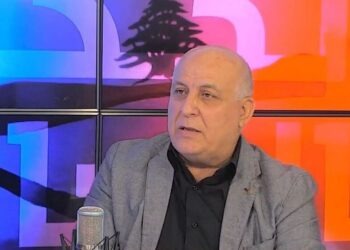

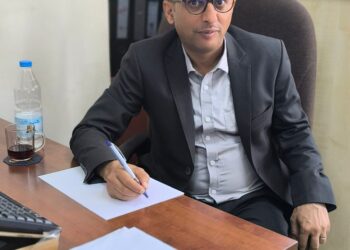

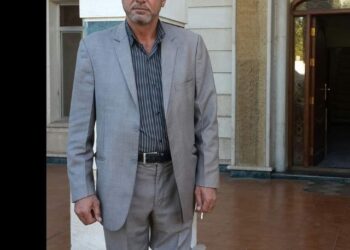





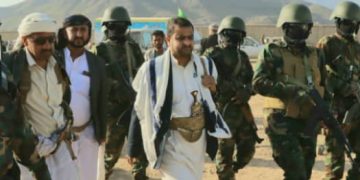
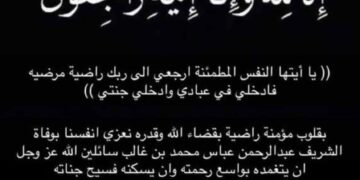
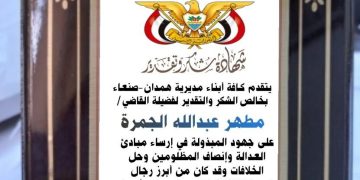
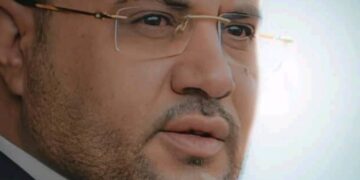

Discussion about this post